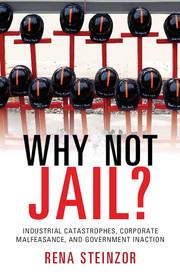Chapter 7 - Institutionalized Recklessness
Published online by Cambridge University Press: 05 December 2014
Summary
The guys who built the Pintos had kids in college who were driving that car. Believe me, no one sits down and thinks: “I’m deliberately going to make this car unsafe.”
Lee Iacocca, former CEO Chrysler CorporationFor most managers, especially for those who are ambitious, the real meaning of work – the basis of social identity and valued self-image – becomes keeping one’s eye on the main chance, maintaining and furthering one’s own position and career. This task requires, of course, unrelenting attentiveness to the social intricacies of one’s organization.
Robert Jackall, Moral Mazes: The World of Corporate ManagersWith other violent crimes we tend to seek explanations as to why people turn to violence – and often use terms like deranged, psychotic, drugged, psychopathic, pathological and other concepts from the vocabulary of severe psychiatric disturbances – and also demand severe punishment … for offenders. Managers, in contrast are ostensibly normal and their decision-making takes place in the board-rooms of companies where well-educated and well-groomed (and arguably “well-balanced”) executives debate business decisions on the basis of strategic, marketing, financial and other considerations. … Presumably no one is fully aware that they are planning death. And yet companies do end up killing and maiming people. Feelings of justice should surely dictate that responsibility will be located at the point where decisions were made, that the corporate officials concerned will be prosecuted, and that they and/or the company will be heavily punished.
Maurice Punch, Suite Violence: Why Managers Murder and Corporations Kill- Type
- Chapter
- Information
- Why Not Jail?Industrial Catastrophes, Corporate Malfeasance, and Government Inaction, pp. 223 - 252Publisher: Cambridge University PressPrint publication year: 2014



